Innovation is at the heart of this initiative, and innovation is fueled by diversity. To ensure that the initiative enhances diversity across critical disciplines, MIT designates, and Accenture will provide graduate financial support for, five Accenture Fellows each year. These fellowships are awarded to graduate students working on research in industry and technology convergence with a preference for students who are first-generation; underrepresented, including by gender identity or expression, and sexual orientation; or demonstrate having overcome significant hardship in achieving their academic pursuits.
For more information on how to apply, current MIT graduate students can visit the MIT School of Engineering’s MIT-Accenture Fellows information page.
2024-2025 Fellows
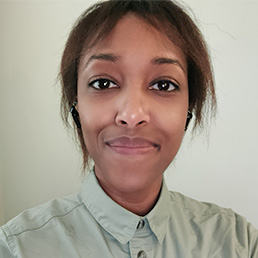
Bilha-Catherine Githinji
Department of Electrical Engineering and Computer Science
Bilha-Catherine (Bilkit) Githinji is a PhD candidate in electrical engineering and computer science whose research interests are focused on guided policy search algorithms for long-horizon decision-making. Specifically, she seeks to develop algorithmic innovations for fast, efficient skill development in data-scarce settings. In her master’s thesis, Bilkit developed new robotic applications to manipulate deformable objects such as cloth, a key capability for the use of robotics in manufacturing, the circular economy, and automation for sustainability, and in less structured environments such as health care settings. Her doctoral research builds on this work to combine ideas from model-based reinforcement learning and guided policy search to address the challenge of data-efficient decision-making for long-horizon robot control tasks. As an Accenture Fellow, Bilkit will investigate dexterous manipulation, tool articulation, and methods of integrating human priors through conceptual policy guidance and generative models. Her work has the potential to advance robots’ ability to efficiently learn to reason over multistep tasks without direct human supervision—a capability with broad implications in data-scarce domains from health care to climate science.
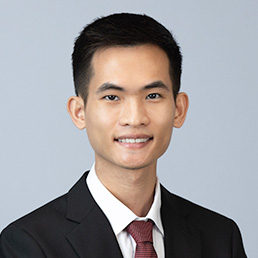
Ryan Huynh
Department of Materials Science and Engineering
Ryan Huynh is a PhD student in materials science and engineering whose research interests are focused on the development of new materials for sustainable, energy-efficient microelectronics. Specifically, Ryan is investigating magnetoelectric multiferroics—in particular, the behavior of epitaxial vertically aligned nanocomposite (VAN) thin films consisting of a ferroelectric material and a ferrimagnetic material grown together—so that their properties are coupled, thus enabling the control of magnetization using an electric field. Supported by an Accenture Fellowship, Ryan will work to develop a directed self-assembly approach using a focused ion beam and pulsed laser deposition to control the formation of ferrimagnetic nanostructures embedded in the ferroelectric matrix. These magnetoelectric VAN structures could enable the development of new forms of low-power memory and logic devices. More broadly, the framework Ryan is developing could lead the way to incorporate other promising ferroelectric and ferromagnetic candidates into VAN structures to offer characteristics and functionalities that existing nanocomposites cannot. By expanding knowledge and capabilities related to the growth and characterization of magnetoelectric multiferroics, Ryan’s work is advancing this highly promising class of materials and pushing the boundaries of sustainable microelectronics.
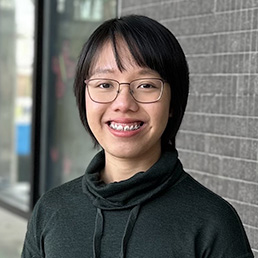
Tran Luu
Department of Biological Engineering
Tran Luu is a PhD student in biological engineering whose research interests focus on the development of new, low-cost cancer immunotherapies. Her research delves into how aberrant sugars, or glycans, in cancer cells suppress the immune system by inhibiting immune cell function. Specifically, Tran seeks to understand mechanistically how sialic acid, a building block of cell- surface glycans upregulated on cancer cells, mediates systemic immune tolerance by engaging with inhibitory receptors called Siglecs on immune cells. This sialylation of the cancer cell pathway is increasingly recognized as a driver for immune evasion and therapeutic resistance in cancers, but its mechanism remains understudied. By providing a deeper understanding of how glycan tolerizes the immune response in cancer, Tran’s research as an Accenture Fellow could pave the way for new treatment approaches targeting the Siglec/sialic acid axis and expand the subset of cancer patients who can be effectively treated with immunotherapy (currently effective for up to approximately 50% of patients). Her work has the potential to fill critical gaps in our understanding of cancer immunology and inform the development of new immunotherapies with broad efficacy.

Jimin Park
MIT Sloan School of Management
Jimin Park is a PhD candidate in business administration whose research interests are focused on developing environmentally and socially sustainable operations in food and agricultural systems. Specifically, she works at the intersection of food and agriculture, policy design, and digital technology with the goal of developing innovative approaches that reduce waste, increase yields and sustainability, and improve the lives of people within these sectors. Her doctoral research draws upon economic modeling, optimization, and field data. As an Accenture Fellow, she will study the design and use of online grocery platforms to reduce household- and retail- level food waste while preserving profitability; explore how governments in developing countries can enhance marginalized farmers’ accessibility to the formal agricultural supply chain through improved policy design; and study how these governments can improve cash-constrained smallholder farmers’ revenue through improved loan programs. Jimin’s interdisciplinary research holds great potential to accelerate technology convergence among digital platforms, policy design, and food and agricultural sectors, which could increase sustainability and generate significant societal impacts.
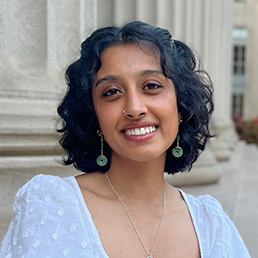
Shreyaa Raghavan
Department of Civil and Environmental Engineering
Shreyaa Raghavan is a PhD candidate in civil and environmental engineering whose research in the field of intelligent transportation systems aims to explore the potential impacts of smart highway infrastructure on decarbonizing the transportation and automobile industries. With support from her Accenture Fellowship, Shreyaa will explore ways to mitigate the detrimental phenomenon of “stop-and-go” traffic using machine learning and optimization methods. This work could inform the development of technology-based interventions (e.g., variable speed limits, driving smartphone apps, cruise controllers, advanced automated vehicles) and ensure cleaner and more efficient roadways. The broader aim of Shreyaa’s work is to demonstrate to policymakers and stakeholders at all levels the value of novel, smart highway infrastructure tools to mitigate controllable congestion and unnecessary emissions—a crucial step toward advancing sustainability in the transportation sector. Her research has the potential to offer robust and generalizable methods addressing critical challenges in sustainability, climate change, and the energy transition and to drive policy change in the spheres of climate change and urban planning.
2023-2024 Fellows
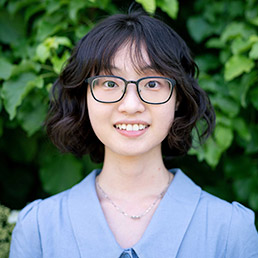
Yiyue Luo
Department of Electrical Engineering and Computer Science
Yiyue Luo is a PhD candidate who is developing innovative integrations of tactile sensing and haptics, interactive sensing and AI, digital fabrication, and smart wearables. Her work takes advantage of recent advances in digital manufacturing and AI, and the convergence in advanced sensing and actuation mechanisms, scalable digital manufacturing, and emerging computational techniques, with the goal of creating novel sensing and actuation devices that revolutionize interactions between people and their environment. In past projects, Yiyue has developed tactile sensing apparel including socks, gloves, and vests, as well as a workflow for computationally designing and digitally fabricating soft textiles-based pneumatic actuators. With the support of an Accenture Fellowship, she will advance her work to combining sensing and actuating devices and explore the development of haptic devices that simulate tactile cues captured by tactile sensors. Her ultimate aim is to build a scalable textile-based closed-loop human-machine interface. Yiyue’s research holds exciting potential to advance groundbreaking applications for smart textiles, healthcare, AR/VR, human-machine interactions, and robotics.
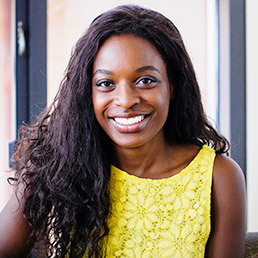
Zanele Munyikwa
Sloan School of Management
Zanele Munyikwa is a PhD candidate whose research explores foundation models, a class of models that forms the basis of transformative general-purpose technologies (GPTs) such as GPT4. An Accenture Fellowship will enable Zanele to conduct research aimed at illuminating the current and potential impact of foundation models (including large language models) on work and tasks common to “high-skilled” knowledge workers in industries such as marketing, legal services, and medicine, in which foundation models are expected to have significant economic and social impacts. A primary goal of her project is to observe the impact of AI augmentation on tasks like copywriting and long-form writing. A second aim is to explore two primary ways that foundation models are driving the convergence of creative and technological industries, namely: reducing the cost of content generation and enabling the development of tools and platforms for education and training. Zanele’s work has important implications for the use of foundation models in many fields, from healthcare and education to legal services, business, and technology.
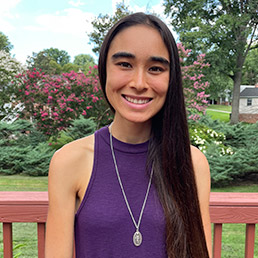
Michelle Vaccaro
Institute for Data, Systems, and Society (IDSS)
Michelle Vaccaro is a PhD candidate in social engineering systems whose research explores human-AI collaboration with the goals of developing a deeper understanding of AI-based technologies (including ChatGPT and DALL-E), evaluating their performance and evolution, and steering their development toward societally beneficial applications, like climate change mitigation. An Accenture Fellowship will support Michelle’s current work toward two key objectives: 1) identifying synergies between humans and AI-based software to help design human-AI systems that address persistent problems better than existing approaches and 2) investigating applications of human-AI collaboration for forecasting technological change, specifically for renewable energy technologies. By integrating the historically distinct domains of AI, systems engineering, and cognitive science with a wide range of industries, technical fields, and social applications, Michelle’s work has the potential to advance individual and collective productivity and creativity in all these areas.
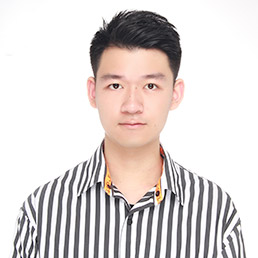
Chonghuan Wang
Department of Civil and Environmental Engineering
Chonghuan Wang is a PhD candidate in computational science and engineering whose research employs statistical learning, econometrics theory, and experimental design to create efficient, reliable, and sustainable field experiments in various domains. In his current work, Chonghuan
is applying statistical learning techniques such as online learning and bandit theory to test the effectiveness of new treatments, vaccinations, and healthcare interventions. With the support of an Accenture Fellowship, he will design experiments with the specific aim of understanding the trade-off between the loss of a patient’s welfare and the accuracy of estimating the treatment effect. The results of this research could help to save lives and contain disease outbreaks during pandemics like Covid-19. The benefits of enhanced experiment design and the collection of high-quality data extend well beyond healthcare; for example, these tools could help businesses optimize user engagement, test pricing impacts, and increase the usage of platforms and services. Chonghuan’s research holds exciting potential to harness statistical learning, econometrics theory, and experimental design in support of strong businesses and the greater social good.
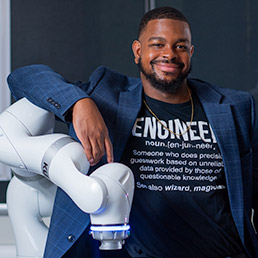
A. Michael West Jr.
Department of Mechanical Engineering
A. Michael West Jr. is a PhD candidate whose research seeks to enhance our knowledge of human motor control and robotics. His work aims to advance rehabilitation technologies and prosthetic devices, as well as improve robot dexterity. His previous work has yielded valuable insights into the human ability to extract information solely from visual displays. Specifically, he demonstrated humans’ ability to estimate stiffness based solely on the visual observation of motion. These insights could advance the development of software applications with the same capability (e.g., using machine learning methods applied to video data) and may enable roboticists to develop enhanced motion control such that a robot’s intention is perceivable by humans. An Accenture Fellowship will enable Michael to continue this work, as well as new investigations into the functionality of the human hand to aid in the design of a prosthetic hand that better replicates human dexterity. By advancing understandings of human bio- and neuro-mechanics, Michael’s work has the potential to support major advances in robotics and rehabilitation technologies, with profound impacts on human health and well-being.
2022-2023 Fellows
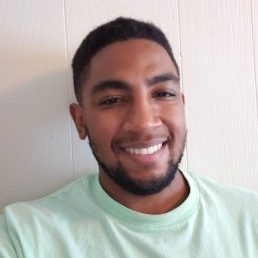
Drew Buzzell
Department of Electrical Engineering and Computer Science
Advisor: Jesús A. del Alamo
Drew Buzzell is a doctoral candidate in electrical engineering and computer science whose research concerns telemonitoring, a fast-growing sphere of telehealth in which information is collected through internet-of-things (IoT) connected devices and transmitted to the cloud. Currently, the high volume of information involved in telemonitoring — and the time and energy costs of processing it — make data analysis difficult. Drew’s work is focused on edge computing, a new computing architecture that seeks to address these challenges by managing data closer to the source, in a distributed network of IoT devices.

Mengying (Cathy) Fang
MIT School of Architecture and Planning
Advisor: Hiroshi Ishii
Cathy Fang is a master’s student in the MIT School of Architecture and Planning. Her research focuses on augmented reality and virtual reality platforms. Cathy is developing novel sensors and machine components that combine computation, materials science, and engineering. Moving forward, she will explore topics including soft robotics techniques that could be integrated with clothes and wearable devices and haptic feedback in order to develop interactions with digital objects.
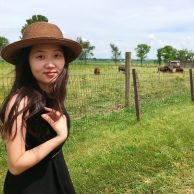
Xiaoyue Gong
MIT Sloan School of Management
Advisor: David Simchi-Levi
Xiaoyue Gong is a doctoral candidate in operations research at the MIT Sloan School of Management. Her research aims to harness the power of machine learning and data science to reduce inefficiencies in the operation of businesses, organizations, and society. With the support of an Accenture Fellowship, Xiaoyue seeks to find solutions to operational problems by designing reinforcement learning methods and other machine learning techniques to embedded operational problems.

Ruby Liu
MIT School of Engineering
Advisor: Pattie Maes
Ruby Liu is a doctoral candidate in the Medical Engineering and Medical Physics program, part of the Harvard-MIT Program in Health Sciences and Technology. Their research addresses the growing pandemic of loneliness among older adults, which leads to poor health outcomes and presents particularly high risks for historically marginalized people, including members of the LGBTQ+ community and people of color. Ruby is designing AI agent systems that facilitate connections between the user and their friends and family, offering mental health care while strengthening and facilitating human-human connections.

Joules Provenzano
Department of Chemical Engineering
Advisor: Desirée L. Plata
Joules Provenzano is a doctoral candidate in chemical engineering. Their work integrates machine learning and liquid chromatography-high resolution mass spectrometry (LC-HRMS) to improve our understanding of complex chemical reactions in the environment. As an Accenture Fellow, Joules will build upon recent advances in machine learning and LC-HRMS, including novel algorithms for processing real, experimental HR-MS data and new approaches in extracting structure-transformation rules and kinetics. Their research could speed the pace of discovery in the chemical sciences and benefits industries including oil and gas, pharmaceuticals, and agriculture.
2021-2022 Fellows
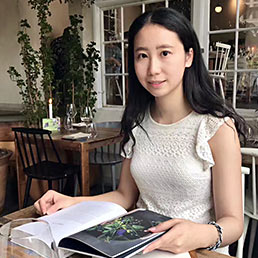
Xinming Liu
MIT Sloan School of Management
Advisor: Retsef Levi and Yanchong (Karen) Zheng
Xinming (Lily) Liu is a PhD student in operations research at MIT Sloan School of Management. Her work is focused on behavioral and data-driven operations for social good, incorporating human behaviors into traditional optimization models, designing incentives, and analyzing real-world data. Her current research looks at the convergence of social media, digital platforms, and agriculture, with particular attention to expanding technological equity and economic opportunity in developing countries. Lily earned her BS from Cornell University, with a double major in operations research and computer science.
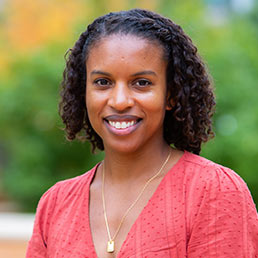
Caris Moses
Department of Electrical Engineering and Computer Science
Advisors: Leslie Kaebling and Tomas Lozano-Perez
Caris Moses is a PhD student in electrical engineering and computer science specializing in artificial intelligence. Caris’s research focuses on using machine learning, optimization, and electro- mechanical engineering to build robotics systems that are robust, flexible, intelligent, and can learn on the job. The technology she is developing holds promise for industries including flexible, small- batch manufacturing; robots to assist the elderly in their households; and warehouse management and fulfillment. Caris earned her BS in mechanical engineering from Cornell University and her MSc in computer science from Northeastern University.
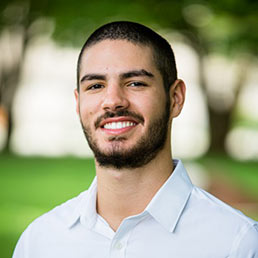
Sergio Rodriguez Aponte
Department of Biological Engineering
Advisor: J. Christopher Love
Sergio Rodriguez Aponte is a PhD student in biological engineering. He is working on the convergence of computational design and manufacturing practices, which have the potential to impact industries such as biopharmaceuticals, food, and wellness/nutrition. His current research aims to develop strategies for applying computational tools, such as multiscale modeling and machine learning, to the design and production of manufacturable and accessible vaccine candidates that could eventually be available globally. Sergio earned his BS in industrial biotechnology from the University of Puerto Rico-Mayaguez.
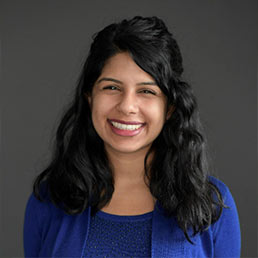
Soumya Sudhakar
Department of Aeronautics and Astronautics
Advisors: Sertac Karaman and Vivienne Sze
Soumya Sudhakar is a PhD student in aeronautics and astronautics. Her work is focused on the co-design of new algorithms and integrated circuits for autonomous low-energy robotics that could have novel applications in aerospace and consumer electronics. Her contributions bring together the emerging robotics industry, integrated circuits industry, aerospace industry, and consumer electronics industry. Soumya earned her BSE in mechanical and aerospace engineering from Princeton University and her SM in aeronautics and astronautics from MIT.
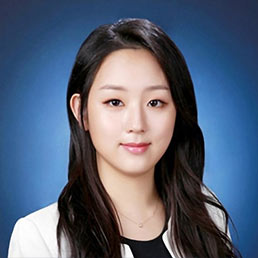
So-Yoon Yang
Department of Electrical Engineering and Computer Science
Advisors: Giovanni Traverso and Anantha Chandrakasan
So-Yoon Yang is a PhD student in electrical engineering and computer science. Her work on the development of low-power, wireless, ingestible biomedical devices for healthcare is at the intersection of the medical device, integrated circuit, artificial intelligence, and pharmaceutical fields. Currently, the majority of wireless biomedical devices can only provide a limited range of medical data measured from outside the body. Ingestible devices hold promise for the next generation of personal healthcare because they do not require surgical implantation, can be useful for detecting physiological and pathophysiological signals, and can also function as therapeutic alternatives when treatment cannot be done externally. So-Yoon earned her BS in electrical and computer engineering from Seoul National University, South Korea and her MS in electrical engineering from the California Institute of Technology.
2020-2021 Fellows
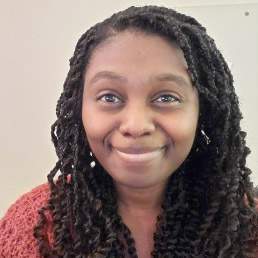
Jacqueline Baidoo
Department of Materials Science and Engineering
Advisor: Associate Professor Elsa Olivetti
Jacqueline Baidoo is a PhD student at the MIT School of Engineering in materials science and engineering who is exploring policy related to materials use. Specifically, her research is focused on waste-to-energy (WTE) strategies that could be adopted at the municipal level to treat and process locally generated waste for use as alternative energy. Her goal is to use machine learning to reduce the barrier to entry of WTE practices in low-income municipalities through the development of a tool that informs municipal decisions around waste management and the construction of WTE facilities. Jacqueline earned a BS in chemistry and BA in physics from Xavier University of Louisiana and a BS in chemical and biomolecular engineering from Georgia Institute of Technology.
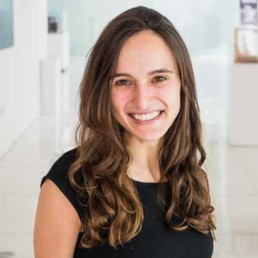
Juliana Cherston
MIT Media Lab
Advisor: Professor Joseph Paradiso
Juliana Cherston is PhD student at the MIT School of Architecture and Planning in the MIT Media Lab. Her work in the Responsive Environments Group is focused on bringing electronic textile technology to low-Earth orbit, prompting an opportunity for convergence among the electronics, textile, and space technology industries. Specifically, she is augmenting large area space fabrics with active sensory functionality, weaving vibration-sensitive piezoelectric fibers and chargesensitive conductive yarns into these specialized materials. Juliana earned a BA in physics and computer science from Harvard University.
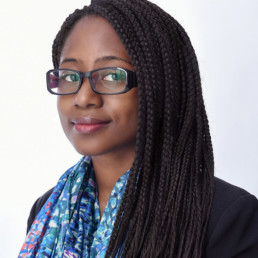
Olumurejiwa Fatunde
Center for Transportation and Logistics
Advisor: Professor Yossi Sheffi, Principal Research Scientist Jarrod Goentzel
Olumurejiwa Fatunde is a PhD student at the MIT School of Engineering studying in the Center for Transportation and Logistics. Her research examines operational challenges that may arise from barriers to extending credit and sharing information among supply chain partners in informal settings. With the proliferation of novel payment platforms, cryptocurrency usage, and natural language processing, Olumurejiwa postulates that there is an opportunity to drive convergence across financial services, telecommunications, and other customer-facing industries in emerging markets. Specifically, she is investigating how technologies could trickle down to the smallest, least formal organizations, helping them to create value for consumers and to be a part of the global economy. Olumurejiwa earned an AB in biomedical engineering from Harvard University and an MSc in international health policy from the London School of Economics, United Kingdom.
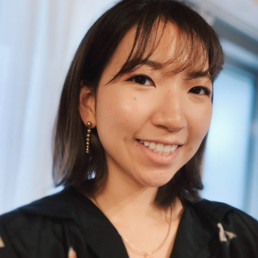
Kaymie Shiozawa
Department of Mechanical Engineering
Advisor: Professor Neville Hogan
Kaymie Shiozawa is a master’s student at the MIT School of Engineering in mechanical engineering whose research explores how robot-aided therapy could potentially address the challenge of improving balance in impaired subjects. Drawing on her experience designing human subject experiments, applying machine learning and mathematical simulations, and designing complex mechanisms for robotics and medical devices, Kaymie aims to design a variable impedance cane and a novel protocol (AdaptiveCane) that encourages unaided balance by progressively reducing the level of assistance provided as a user’s performance improves. Kaymie earned an SB in mechanical engineering from MIT.
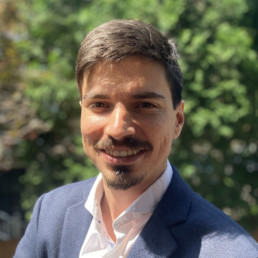
André Medeiros Sztutman
Department of Economics
Advisor: Professor Robert Townsend
André Medeiros Sztutman is PhD student at the MIT School of Humanities, Arts, and Social Sciences studying economics. Leveraging the increasing availability of data in the gig economy, his work focuses on the development of tools for tackling adverse selection in insurance markets. By creating tools that make better use of information—especially in situations where it is particularly needed—he is contributing to the convergence of different industries: gig platforms, reporting agencies, and the insurance business. André earned a BSc in economics from the Universidade de Sao Paulo, Brazil and an MSc in economics from Pontificia Universidade Catolica do Rio de Janeiro, Brazil.
